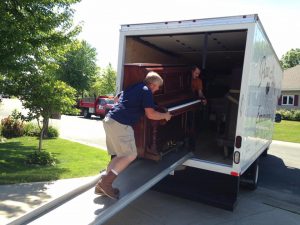How Weather Can Affect a Piano
With a hot summer soon giving way to a cool autumn, many may be wondering how temperature shifts can affect their piano. Playing and caring for pianos involves a great deal of work and even certain factors outside of everyday use can damage this delicate instrument. It is important to exercise caution with your piano, especially during the moving process. Both weather and indoor air quality can affect a piano in several ways. At Piano Movers Extraordinaire we specialize in piano moving and piano storage for Ramsey County and the surrounding areas and know the proper ways to care for and transport a piano. That is why we’ve put together a short outline of some of the ways weather can affect a piano.

As you are likely already aware, pianos are complex instruments. They consist of wires, wooden frames, hammers, dampers and keys. When you press a key or a combination of them, they raise corresponding hammers. Those hammers then strikes the strings of which they are attached. At the same time, this lifts the dampers designed to prevent sound from occurring when the keys aren’t being played. There is a lot that goes into a single note. That is why sometimes the smallest change in environment or temperature can throw things off. Each string and its corresponding parts can be vulnerable to certain conditions such as heat, cold and humidity. While pianos are designed to withstand routine playing, they’re actually quite delicate especially when left untouched; that is why it is so important to routinely play your piano. It is equally important to ensure the proper moving and storage of your piano. If left alone in a hot, cold or humid environment void of climate control, there are a number of effects your piano could experience.
Warm Weather
Warmer temperatures like the ones we’re currently experiencing can cause piano strings to grow slightly, much like running hot water over a glass jar’s metal rings to loosen them. Warmer weather can also cause the wood in pianos to expand and swell.
Moisture
High levels of moisture in the air causes the soundboard to swell. Low humidity levels cause it to shrink.
Cold Weather
Cold weather is known to cause piano strings to contract. This means they grow slightly shorter. Since they’re wound so tightly, this can place an incredible amount of excess pressure on the strings and keys. At the same time, cool temperatures make the wood in pianos and their soundboards warp and contract.
While you can’t necessarily see these effects because they’re extremely minimal from a visual point of view, those who are familiar with the distinct sounds of a piano can certainly hear the impact.
Are you interested in getting information about proper piano moving and piano storage in the Ramsey County area? Please call 763-784-8123 or fill out our online form for a free estimate.

